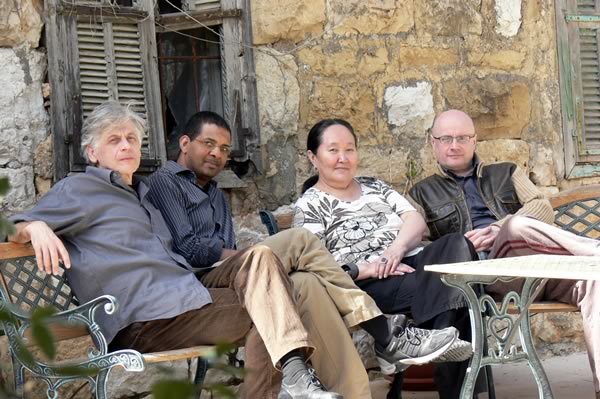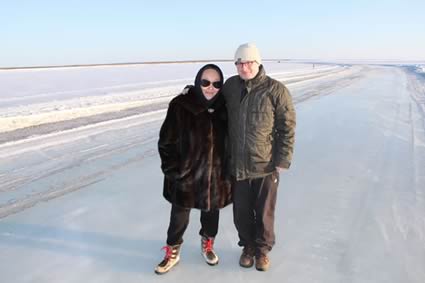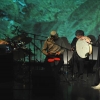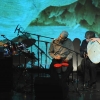STEPANIDA AND FRIENDS [ 2008 ]
Intensive schamanistische Gesänge aus der Republik Sakha (Sibirien)
Konzert in Beirut/Libanon 2008 mit Stepanida Borisova, Hubl Greiner, Mohamed Badawi & Roman Bunka beim Al Bustan Festival in Beirut.
CD TranceSiberia: En Kellergin (When You Come To Me) Fotos von Peter Gannushkin, Claudia Knupfer und Stefan Postius.
STEPANIDA AND FRIENDS
Intensive schamanistische Gesänge aus der Republik Sakha (Sibirien) treffen auf heutige westliche Kulturen. Von traditionellen, mythischen Erzählungen, rituellen Zeremonien bis zu zeitgemäßen, urbanen Formen.
Intensive interpretation of shamanic singing from Sakha (Siberia), combined with todays western club-culture – from tradtional and mystic essays, ritualistic ceremonies to modern urban forms.
Der Gesang von Stepanida Borisova ist ein schamanistisches Ritual (welches in ihrem Heimatland Sakha noch heute praktiziert wird) und führt in längst vergangene Zeiten zurück. Die Ursprünge ihrer Musik findet man bereits 3000 Jahre vor Christus. Sie ist verwandt mit der Sankrit-Musik aus Indien und wahrscheinlich eine der ältesten Musiken unserer Erde. Die Lieder von Stepanida Borisova werden auf spannende und respektvolle Art und Weise mit den experimentellen Sounds und Grooves der zeitgemässen Laptop-Szene, sowie mit Rock, Jazz und arabischen Spielweisen verwoben.
„STEPANIDA BORISOVA (Siberia) THROAT SONGS OF THE SIBERIAN SHAMAN. This is a unique opportunity to gain some insight into this ancient and powerful means of vocal expression and to receive training from a performer of renown in both the folk and theatre worlds.“

Bild v.l.n.r. Roman Bunka, Mohamed Badawi, Stepanida Borisova & Hubl Greiner beim Al Bustan Festival in Beirut/Libanon im März 2008. (Foto: Alec)
STEPANIDA BORISOVA
Gesang (Sakha/Sibirien)
Stepanida Borisova wurde 1950 im Distrikt von Megino-Khangalaas in der sibirischen Republik Sakha (Yakutien) geboren. Nach ihrem Studium an der berühmten Shepjin-Theaterschule in Moskau startet sie 1974 ihre Schauspielkarriere am Ojunski-Sakha-Theater. Stepanida Borisova erhält den Ojunski-Staatspreis und ist seitdem in der Russischen Föderation eine gefeierte Schauspielerin. Als Sängerin und Performerin beherrscht Stepanida alle unterschiedlichen Stilrichtungen des traditionellen yakutischen Gesangs, der tief im Schamanismus verwurzelt ist. (In Sakha wird erzählt, Stepanida würde Krankheiten heilen). In enger Zusammenarbeit mit Künstlern ihres Landes beteiligt sich Stepanida Borisova massgeblich an einer zeitgemässen Weiterentwicklung der yakutischen Kultur und engagiert sich hierfür auch in internationalen Projekten.
Gastspiele in Mexiko, USA, Finnland, Libanon, Deutschland, Japan, Polen, Norwegen, Italien, Frankreich, Tschechien, Hongkong, Ungarn, Großbritannien und in den Ländern der ehemaligen UdSSR) dokumentieren Stepanida Borisovas internationales Renommee.
STEPANIDA BORISOVA is born in 1950 in the District of Megino-Khangalaas in the Siberian Republic of Yakutia. After her studies at the famous Shepjin School of Acting, she started in 1974 an acting carrier at the Ojunski-Sakha-Theatre. She received, as well, the Ojunsky prize from the USSR and is a celebrated actress since this time. As a singer and performer Stepanida mastered many different styles of the traditional Sakha singing. In the entire Russian Federation and abroad, Stepanida Borissova won her special place in the world of music mainly as a singer of „tojuks“ (improvised, epic songs).
Stepanida sings „ugadan kurduk“ as a shaman. In Kamlania female shamans are considered more powerful than male shamans. Though it is difficult to prove, it is said that her voice has healed people. With a unified work with other artists of her country she has been very important in the further developement of the Sakha culture.
For this, she also is highly engaged in international projects. She has made many guest appearences in international Theatre from such countries as, Mexico, USA, Finnland, Germany, Japan, Poland, Norway, Italy, France, the Czech Republic, Hongkong, Hungary, Great Britain and in the lands of the once USSR. In these countries she toured giving many concerts and has received international acclaim.
HUBL GREINER
Kompositionen, Drums, Laptop, Electronics
Hubl Greiner ist ein musikalischer Grenzgänger, der sich mit Lust über den Abgrund beugt und manchmal auch weiter. Neben „HULU PROJECT“ kennt man ihn vor allem als ehemaligen Kopf der deutschen Kult-Band „THE BLECH“, sowie als Produzent zahlloser Acts und Projekte. Er hat sich über die Grenzen Deutschlands hinaus einen Namen als unkonventioneller, innovativer und experimentierfreudiger Musiker, Komponist und Filmemacher gemacht.
Inspiriert durch die musikalische Subkultur abseits des Mainstreams begann er Anfang der 1970er Jahre Schlagzeug und Bass zu spielen. Seine Einflüsse führen auf Bayerische Volksmusik, Jazz, Rock, Punk, Klangkunst und Neue Musik zurück.
Durch das Zusammentreffen mit anderen Musikern haben sich für Hubl neue Horizonte geöffnet. Prägend waren dabei vor allem die Begegnungen mit den Jazz- und Avantgardemusikern der europäischen „Rock in Opposition“ Szene, den Musikern des unabhängigen Musikernetzwerks „Schneeball“, den Yoruba-Trommlern aus Nigeria, nordamerikanischen Indianern (Navajos, Northern Tutchones, Lakotas, Cherokees und O’odhams), Musikern aus dem asiatischen Kulturkreis, Underground-Musikern aus dem früheren Ostblock, Hip Hop Künstlern aus Frankreich, der einzigartigen Iva Bittová, dem sudanesischen Sufi Mohamed Badawi, dem legendären südindischen Tavil-Meister Paramashivam und der ebenso legendären schamanistischen Sängerin Stepanida Borisova aus Sibirien.
Hubl Greiner is known for many projects in testing the validity of border-setting in music. He enjoys to look deep into the abysm and sometimes further. He is an eclectic composer/musician who seems to draw on everything from Pop forms to Jazz, World or the most abstruse modernist styles, and he uses these disparate elements to create his works.
„…a devil-of-a-fellow and probably one of the most creative producers and musicians in his profession in Europe“ /// Ear Magazine New York
ROMAN BUNKA
Gitarre, Oud, Rahmentrommel
„Roman Bunka is one the greatest guitar players I’ve ever had the pleasure to listen to.“ Henry W. Targowski (in Mark/Space, 1996).
Zusammenarbeit mit dem Flamenco-Gitarristen „Tomatito“, mit Mal Waldron, Jean-Michel Jarre, Hubert von Goisern, Trilok Gurtu, dem nubischen Sänger Mohamed Mounir, mit dem Geigen-Virtuosen Abdu Dagir aus Kairo, mit Embryo, den Dissidenten, Hamid Baroudi, Blixa Bargeld und vielen anderen. Filmmusik zum Kinofilm „Bin ich schön?!“ – Regie Doris Dörrie, sowie zum Kinofilm „Al Oud“ von Fritz Baumann (Filmpreis 1992 beim Chicago International Film Festival) u.a.
Roman Bunka is one of the most prominent German ud players and guitarists. He was born in 1951. Bunka was a founding member of several of the most influential German rock bands, including avant garde rock bands like Embryo and Aera. He impressed fellow musicians with his oriental style of guitar playing.Bunka was so immersed in Egyptian music that he even represented Egypt with the Nubian singer Mohamed Mounir as arranger and ud-soloist at the Mediterranean Culture Festival in 1992 in Nimes, France.
With solo-concerts in Tunis (Festival de la Medina), Cairo, Damascus, Aleppo and Beirut as well as in Lanzarote with the group Vox and his performance at the Jazz Festival in Granada he was able to bring his vision of Arabic music closer to an interested World-music audience …He has worked with the Flamenco-guitarist „Tomatito“, with Mal Waldron, Jean-Michel Jarre, Hubert von Goisern, Trilok Gurtu, Mohamed Mounir, Abdu Dagir, Hamid Baroudi, Blixa Bargeld and many others.
Filmmusic with Doris Dörrie and for „Al Oud“ Fritz Baumann (Film award 1992 at the Chicago International Film Festival) etc. „Roman Bunka is one the greatest guitar players I’ve ever had the pleasure to listen to.“ Henry W. Targowski (in Mark/Space, 1996).
www.romanbunka.com
www.youtube.com
MOHAMED BADAWI
Oud, Percussion, Sufi-Gesang (Sudan)
Mohamed Badawi ist Komponist und Sänger und spielt neben Oud, welche im Mittelpunkt seiner musikalischen Darbietungen steht, eine spezifisch sudanesische Bongo-Variante, die aus drei Trommel besteht.
Das Erlernen traditioneller afrikanischer Rhythmen begann für ihn schon im Alter von 5 Jahren und diese Rhythmen prägen auch seine Musik. Gesanglich deckt er die ganze Bandbreite arabischen Liedguts ab, von historisch religiösen Sufigesängen bis zu ausgelassen internationalen Songs der Gegenwart. Er kommt aus der bekannten Sufi-Familie der Gadiriyya und lebt seit 1984 in Lyon, Paris und Konstanz.
Mohamed Badawi is founder, composer and singer of the groups Badawi-Project, Diwan and El Nour. The oud, or Middle-East lute, plays a central role in his musical renditions. In addition to the oud, he also plays a Sudanese variation of the Bongos, which consists of three drums. He began learning the traditional rhythms of his homeland as early as the age of five and these skills influence and enrich his music. Vocally, he covers the entire Arabic musical spectrum, from the historical religious Sufi music to the lively modern music heard world-wide. He stems from the well-known Sufi family of the Quadiriyya and has lived in Europe since 1984.
Since 1987 Mohamed Badawi has collaborated in numerous projects with musicians from all over the world. He has had the pleasure of working with Iyad Himour and the group Palmyre (Syria), Naziha Azzouz (Algeria), the expert tabla player Ibrahim El Minyawi (Egypt), Tunji Beier (Australia), Matthias Loibner (Austria), Moussa Selkh (Algeria), Haja and Lego (Madagascar), and Afrique Loloé, to name a few, as well as Diara Konaté (Guinea), Haisam Salah Edine (Lebanon), Surendran Reddy (South Africa), Chiha (Tunesia), and the choreographer Peter Czerner (USA). In 2000, he took oud classes from the Syrian professor Adnan Aylouch in Damascus.
He composed music for dance and puppet theater performances in Germany and Switzerland. In 2000, the lord mayor of Constance honored Mohamed Badawi in the name of the Internationaler Tag des Freiwilligen Engagements (the International Day of Volunteer Commitment) for his dedicated efforts in school projects in Sudan. Mohamed Badawi is also doctor of linguistics. He is the founder of a high school project for education and cultural exchangea and he is the founder of Sudan Education Project (Supporting education in Sudan, supporting street children in Sudan, founding the „Nihal European University in the Sudan“, supporting cultural exchange.
JEAN DETHEUX
Computer-Kunst (Montreal/Kanada)
Der kanadische Computer-Künstler Jean Detheux hat für „Stepanida & Friends“ Echtzeit-Projektionen für Großleinwand entwickelt.
Jean Detheux ist ein Künstler und Philosoph, der sich seit vielen Jahren mit Malerei beschäftigt. In den letzten 10 Jahren kam er mehr und mehr von der traditionellen Malerei zur digitalen Malerei. Seine Live-Performances wurden mehrfach ausgezeichnet. Die abstrakten Bilder werden mit digitaler Technologie in Realtime realisiert. Die Bilder enstehen durch die Interaktion zwischen dem Maler und den Musikern.
Belgian-Canadian artist Jean Detheux creates exquisite, rapturous digital paintings and otherworldly videos inspired by his philosophical studies. For over thirty years he worked in natural media, but he made the transition to digital media when he found that the materials he used were causing severe allergic reactions.
His experience with natural media “paved the way” for his digital work, his story of personal reincarnation. His use of digital media is both eloquent and innovative, simultaneously sublime and transcendental, a “visual phenomena.” Jean is involved in the Film Board of Canada and is frequently invited to show his animations and lecture at film festivals and other events open to experimental art.

Hubl Greiner und Stepanida Borisova auf der zugefrorenen „Lena“ in Sibirien, 2010
Bilder vom Konzert in Beirut 2008
CD „TranceSiberia“
(mit Stepanida Borisova, Luigi Archetti, Hubl Greiner u.a.)
Platz Nr. 3 in den World Music Charts Europe 2001
PRESSCLIP [ Folk-tales Portland USA ] „Already climbing the World Music charts in Europe, it’s sure to become a classic in the experimental sub-genre. TranceSiberia breaks barriers most musicians wouldn’t even consider, let alone ponder. A must have“.



